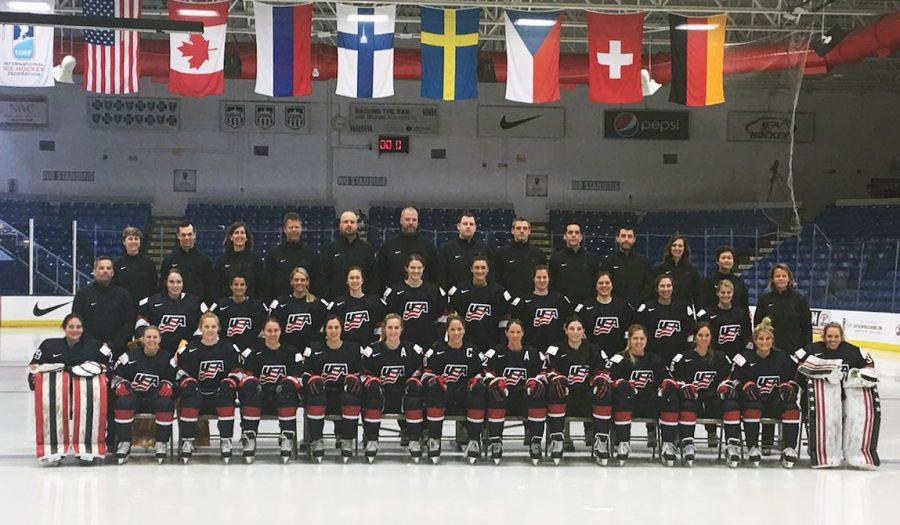Long Road Ahead for Equitable Support in USA Hockey
The U.S. Women’s National Hockey Team boycotted the 2017 International Ice Hockey Federation Women’s World Championships on March 15 due to inequality in pay.
April 3, 2017
When it comes to equitable opportunities for men and women, USA Hockey isn’t doing well. Members of the U.S. Women’s National Hockey Team announced a boycott of the 2017 International Ice Hockey Federation Women’s World Championships via social media this past month. The team’s captain, Meghan Duggan, posted an explanation of the decision on Twitter — she cited a lack of progress in negotiations with USA Hockey concerning fair wages and equitable support as compared to the men’s program.
US WNT will not play in 2017 World Championship due to stalled negotiations over fair wages and support from USA Hockey #BeBoldForChange pic.twitter.com/LYphd7uT38
— Meghan Duggan (@mduggan10) March 15, 2017
Unfortunately, fair pay and equitable support for women in the sports world isn’t a new fight. This particular episode harkens back to another women’s national team fighting for equal pay in 2016: the U.S. Women’s National Soccer Team. Five players filed a lawsuit against the U.S. Soccer Federation for wage discrimination, citing the large gap between what the women and men were paid, despite the female league’s far greater success on the field. Sound familiar?
The U.S. Women’s National Hockey Team and USA Hockey reached a private agreement on Tuesday, March 28. This consensus came just in time for the team to defend its gold medal at Worlds beginning that Friday. In the opening United States vs. Canada preliminary game — always a crowd-drawing rivalry — the U.S. Women’s National Hockey Team soundly defeated the team from the north 2-0 with only 48 hours of preparation. The following preliminary game on Saturday featured the U.S. women trouncing Russia 7-0.
The success was to be expected of the national team, which has won gold in every championship since 2005, excluding 2007 and 2012 when they won silver. The team has also medaled in every Olympics since 1998, when women’s hockey was first introduced to the games. Compare this with the U.S. Men’s National Hockey Team, which has only won two medals in the World Championships since 2005 — both of them bronze. Although the men’s team won silver in the 2010 Olympics, it fell short of the podium in Sochi 2014. The women’s consistent international success is what makes their fight and boycott significant.
In spite of their success on ice, the women on the national team are not compensated in nearly the same way as the men are — most of them are on NHL contracts that earn them hundreds of thousands of dollars a year. Because the men make millions, USA Hockey doesn’t really need to provide them with more funds. The U.S. Women’s National Hockey Team, in contrast, had to slash salaries this season, which were already low — anywhere from $10,000 to $26,000 per year — to begin with. According to the statement put out by the team’s lawyers, USA Hockey pays players only $1000 per month for six months during an Olympic year — that’s $6000 every four years and $125 a month. Still, USA Hockey expects players to train and compete full-time in non-Olympic years as well.
Although men do not receive more money from USA Hockey, they still get more benefits, according to USA Today. The men’s team receives far greater support for travel expenses, equipment, publicity, meals and transportation.
It’s not just the wages and compensation, either. The statement also outlines a lack of effort to grow and develop the sport for women. Where USA Hockey spends $3.5 million annually on the National Team Development Program for boys, there is no comparable program in place for girls. Where the National Team Development Program grows the men’s sport and is able to financially support underrepresented populations and players like Toronto Maple Leafs star rookie Auston Matthews in pursuing their dreams, many girls simply do not get that opportunity.
But instead of working with the national team to continue negotiations, USA Hockey opted to reach out to players they had previously spurned — and perhaps, more egregiously, high school students on the U-18 national team. USA Hockey would have rather put teenagers against adults in the World Championships than work with the U.S. Women’s National Hockey Team to resolve the issues. What’s more telling is that the players USA Hockey reached out to turned them down — emblematic of a shared unity and support of the growth and success of the women’s program. As the #BeBoldForChange hashtag states proudly, these women are choosing to stand together.
The U.S. Women’s National Hockey Team and USA Hockey may have come to an agreement. But there’s a long, long way to go before we can say there’s equitable support in this sport for girls and women. The University of North Dakota — a school known for its success in hockey, in both male and female leagues — just announced it would be cutting its women’s hockey program. A petition appealing to UND to keep the program currently has 3,264 signatories. There’s no illusion that this is the final word in reaching equity for USA Hockey and the U.S. Women’s National Hockey Team, but the agreement and the harsh spotlight the boycott brought are a step forward.
A version of this article appeared in the Monday, April 3 print edition. Email Kaitlyn Wang at [email protected]
























































































































































